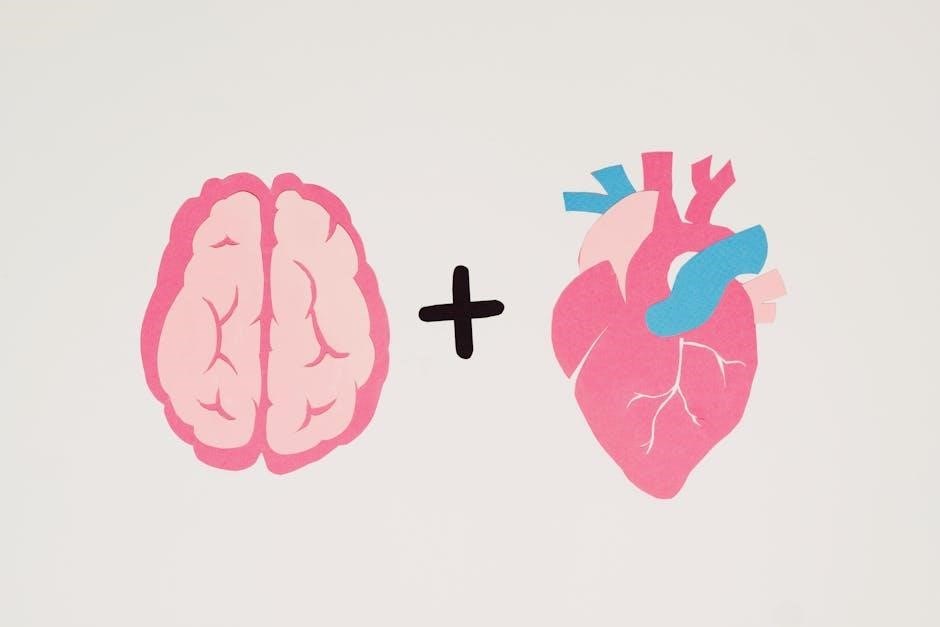Emotional Intelligence (EI) is a skill set popularized by Daniel Goleman, linking self-awareness, empathy, and social skills to personal and professional success, as detailed in his landmark book.
Definition and Concept of Emotional Intelligence
Emotional Intelligence (EI) is a skill set that enables individuals to recognize, understand, and manage their own emotions and those of others. Popularized by Daniel Goleman, EI involves four key components: self-awareness, self-regulation, empathy, and social skills. It emphasizes the ability to navigate social complexities, make informed decisions, and build strong relationships. Unlike IQ, EI is not fixed and can be developed through practice and awareness. Goleman’s work highlights its significance in personal and professional success, making it a vital aspect of modern psychology and leadership development.
Historical Background and Daniel Goleman’s Contribution
Emotional Intelligence (EI) gained prominence through Daniel Goleman’s 1995 book, Emotional Intelligence: Why It Can Matter More Than IQ. Goleman popularized the concept, building on earlier research by Peter Salovey and John D. Mayer. His work introduced EI as a combination of self-awareness, self-regulation, empathy, and social skills. Goleman’s contribution lies in linking EI to real-world applications, such as leadership and education, making it accessible beyond academic circles. His insights revolutionized understanding of human behavior and success, emphasizing EI’s role in personal and professional achievements.

The Core Components of Emotional Intelligence
Emotional Intelligence comprises self-awareness, self-regulation, motivation, empathy, and social skills, as outlined in Daniel Goleman’s work, essential for personal and professional effectiveness.
Self-Awareness and Self-Regulation
Self-awareness involves recognizing and understanding one’s emotions, while self-regulation is managing those emotions effectively. These skills, as outlined in Daniel Goleman’s work, are foundational to emotional intelligence, enabling individuals to respond thoughtfully rather than react impulsively. Developing self-awareness through practices like mindfulness or journaling helps improve self-regulation, fostering better decision-making and emotional balance. These components are crucial for personal growth and interpersonal harmony, as they allow individuals to navigate emotions constructively and maintain resilience in challenging situations.
Motivation, Empathy, and Social Skills
Motivation drives individuals to pursue goals and adapt to challenges, while empathy enables understanding others’ emotions, fostering connection. Social skills facilitate effective communication and conflict resolution. Together, these elements, as highlighted in Daniel Goleman’s work, enhance personal and professional relationships. High empathy and strong social skills promote collaboration, while motivation sustains focus and resilience. These traits collectively contribute to emotional intelligence, empowering individuals to inspire and lead others, creating harmonious and productive environments in both personal and workplace settings.
The Importance of Emotional Intelligence
Emotional Intelligence is crucial for success and well-being, enhancing leadership, relationships, and decision-making. It fosters resilience, effective communication, and empathy, benefiting both personal and professional life.
Impact on Personal and Professional Success
Emotional Intelligence significantly influences personal and professional success by enhancing decision-making, stress management, and interpersonal relationships. High EI individuals excel in leadership roles, fostering collaboration and trust. They adapt better to challenges, communicate effectively, and build strong networks. In the workplace, EI improves employee satisfaction and performance, while in personal life, it strengthens relationships and mental well-being. Studies, including those referenced in Daniel Goleman’s work, highlight EI as a key predictor of success, surpassing traditional measures like IQ in many contexts.
Role in Workplace and Academic Environments
Emotional Intelligence plays a vital role in workplace and academic environments by fostering collaboration, improving communication, and enhancing problem-solving skills. In the workplace, high EI individuals are better leaders, build stronger teams, and manage stress effectively; In academic settings, EI helps students manage pressure, interact positively with peers, and achieve better outcomes.Daniel Goleman’s work emphasizes how EI can be cultivated to improve both professional and educational performance, making it a valuable skill for long-term success.
Emotional Intelligence in Education and Child Development

Emotional Intelligence (EI) is crucial in education and child development, fostering self-awareness, empathy, and social skills. Daniel Goleman highlights how EI helps children manage emotions, improve behavior, and achieve academic success. Teachers play a key role in nurturing EI through supportive environments and cooperative learning; Goleman’s work emphasizes that cultivating EI from an early age enhances resilience, relationships, and emotional well-being, setting a foundation for lifelong personal and professional growth.

Daniel Goleman’s Book on Emotional Intelligence
Daniel Goleman’s 1995 best-selling book introduced Emotional Intelligence, highlighting its role in success beyond IQ. The PDF is widely available for download and reading.
Key Arguments and Insights from the Book
Daniel Goleman’s book challenges traditional views of intelligence, emphasizing Emotional Intelligence (EI) as a crucial factor in personal and professional success. He argues that EI, comprising self-awareness, empathy, and social skills, significantly influences how individuals navigate relationships and challenges. Goleman illustrates how high EI fosters effective leadership, better decision-making, and emotional well-being. He also provides practical strategies for developing EI, highlighting its potential to enhance education and workplace dynamics. The book underscores EI’s transformative power, offering insights into cultivating emotional competence for a fulfilling life.
Downloading and Accessing the PDF Version
Daniel Goleman’s Emotional Intelligence: Why It Can Matter More Than IQ is widely available in PDF format online. Readers can download the book from various platforms, including academic databases, online libraries, and file-sharing sites. The PDF version offers convenient access, allowing readers to explore Goleman’s insights on EI anytime, anywhere. Ensure to use reliable sources to download the file for a seamless reading experience. This digital format makes Goleman’s groundbreaking work easily accessible to a global audience.

Practical Strategies for Developing Emotional Intelligence
Daniel Goleman suggests practices like self-reflection, mindfulness, and empathy exercises to enhance emotional intelligence, fostering better relationships and decision-making in personal and professional life.
Techniques for Enhancing Self-Awareness and Empathy

Self-awareness and empathy are core components of emotional intelligence. Techniques include journaling emotions, practicing mindfulness, and engaging in active listening. Daniel Goleman emphasizes the importance of recognizing personal triggers and understanding others’ perspectives. Empathy can be cultivated through perspective-taking exercises and fostering meaningful connections. These practices enhance interpersonal relationships and improve emotional regulation, aligning with Goleman’s insights in his book on Emotional Intelligence.

Leadership and Emotional Intelligence
Emotional intelligence is a cornerstone of effective leadership, as highlighted by Daniel Goleman. Leaders with high EI excel in self-awareness, empathy, and social skills, fostering trust and collaboration. Goleman’s work emphasizes that emotionally intelligent leaders inspire teams, manage conflicts, and drive organizational success. By understanding and regulating their emotions, leaders create a positive work environment, aligning with Goleman’s insights in his book on Emotional Intelligence.
Why Emotional Intelligence Matters More Than IQ
Daniel Goleman argues that emotional intelligence matters more than IQ, as it drives personal and professional success, fostering empathy, self-awareness, and social harmony in all interactions.
Goleman’s Perspective on Intelligence and Success
Daniel Goleman challenges traditional views of intelligence, emphasizing that emotional intelligence (EI) often outweighs IQ in achieving success. In his work, he argues that EI—encompassing empathy, self-awareness, and social skills—is crucial for personal growth and professional effectiveness. Unlike IQ, EI can be developed and strengthened over time, making it a key driver of leadership and interpersonal harmony. Goleman’s perspective underscores the importance of understanding and managing emotions to foster better relationships and overall well-being in both personal and professional contexts.
Recent Studies and Trends Supporting EI
Recent studies highlight the growing recognition of emotional intelligence (EI) as a critical factor in personal and professional success. A CareerBuilder survey revealed that 71% of employers value EI over IQ, emphasizing its role in workplace dynamics. Modern trends show EI enhances leadership effectiveness, fostering better collaboration and decision-making. With the rise of hybrid work environments, EI is increasingly seen as essential for navigating interpersonal challenges and building resilient teams. These findings underscore EI’s relevance in contemporary professional and social contexts.
Emotional Intelligence, as Daniel Goleman emphasizes, is crucial for personal and professional success, offering a pathway to enhanced empathy, leadership, and overall well-being in a rapidly changing world.
Benefits of High Emotional Intelligence
High emotional intelligence fosters personal and professional success, enhances relationships, and builds resilience. It enables effective leadership, empathy, and stress management, while promoting self-awareness and social harmony, as Goleman highlights.
Future Implications and Applications of EI
Emotional Intelligence (EI) will play a pivotal role in shaping future education, leadership, and workplace dynamics. As technology advances, EI will be integrated into AI and machine learning to enhance human interactions. Schools are likely to adopt EI training to foster empathy and collaboration among students. Organizations will prioritize EI in leadership development to create compassionate and effective leaders. Goleman’s insights highlight EI’s potential to address global challenges, making it a cornerstone of personal and societal progress in the coming decades.

Leave a Reply